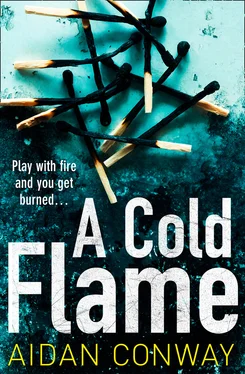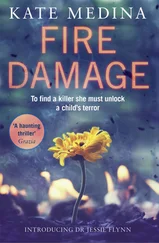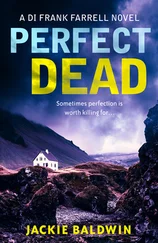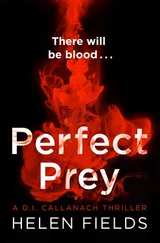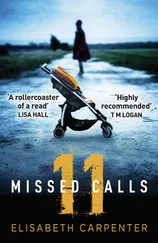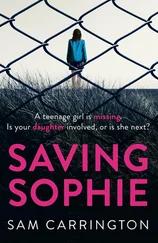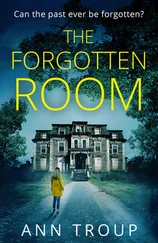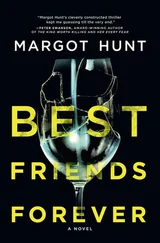“And you then took him to view the corpse, I presume,” said Rossi.
“Given the circumstances, I waived normal practice. I followed my conscience, feeling that he and the victim had likely been acquaintances or even relatives. They were, as far as I could see, both of West African appearance and I deduced they could easily have been co-nationals.”
“And yet the identification was negative,” said Rossi.
“Well, that is the central issue here, Inspector. As I pulled back the cover, apart from the reaction of shock you might expect – you know, of course, how he was killed.”
Yes, Rossi knew. His throat had been cut, almost to the point of decapitation.
“The reaction I witnessed was consistent with recognition. I have seen it enough times to be reasonably confident. He was restrained, yes, but when I asked him to confirm whether or not he could positively identify the corpse he gave a firm ‘no’ and that was that. He then asked to leave and began to get rather agitated. I think he also feared that he might be detained or reported to the police. I let him out through a side door as I didn’t want him to have to face the other staff and I didn’t want anyone asking me awkward questions. I would be able to manage that better by myself. I’ve had plenty of practice.”
Rossi looked at Carrara.
“So, if he did recognize him, why didn’t he say so?”
“As I said, presumably fear of being detained, as an illegal, even if that hadn’t stopped him stepping into the lion’s den in the first place. He took a big chance.”
“Are you sure he was a migrant?” said Carrara. “How did you know?”
“I presumed he was. I suppose from his clothing. I mean he really wasn’t dressed for winter. He looked itinerant, tired, and he wasn’t streetwise yet, not in the Roman sense. He seemed fresh out of Africa. It was the impression I got, but I’ve met many such people in my work and in my voluntary activities too. I help out sometimes with a group providing assistance to refugees and migrants.”
“So,” said Rossi, “Iannelli was or wasn’t connected? You said you thought it was a ruse, the business card, a stratagem on his part. What makes you think differently now?”
“I just think that maybe there was something important, something more to it than I first thought. When I heard Dottor Iannelli had survived the attack in Sicily and when the stories began to emerge about corruption in the Detention Centres, I thought that maybe their paths could have crossed in some way. I didn’t give it serious thought at the time, but later I wondered if I’d been hasty in dismissing it out of hand. And then there was the fire on Via Prenestina. All those people. At least one of them was West African too. Call it intuition or instinct but it has continued to prey on my mind, every day – the thought that there could even be a connection. And when I heard you talking about him this morning, it seemed like I had to seize an opportunity to put things straight. I had thought about going to a police station but I was concerned for my position. I didn’t know what to do. It could have come out looking very bad for me. Do you understand?”
Rossi could see she was taking a chance, putting trust in him. It was courageous, a quality he admired.
“Well,” said Rossi, “as luck would have it, we were on our way to the hospital to pay a visit to the pathologist. Our paths may well have crossed anyway.”
His comment raised a more relaxed smile. She had a conscience, he reflected, but she didn’t look like someone who put much stock in fate. Compassionate but practical, realistic. She had to be.
“Did Jibril have an address for the person he was looking for?” asked Carrara.
“He gave me one but it was false. I checked it but I let it go. You have to understand how emotional and how trying all this can be. He needed to know and as far as I was concerned there was no ulterior motive, no other reason for his being there. You know, it did even occur to me that they might have been lovers.”
“Well,” said Carrara, “he was clearly covering all bases if he didn’t want to give a real address. He wanted to appear credible without leaving any trail. As you say, probably the illegal immigrant’s preservation instinct.”
“And his name?” said Rossi. “Do you think he gave you his real name?”
“Like I said, it was Jibril, but more than that I don’t know.”
“Well, it looks like we will have to get on to Dario,” said Rossi to Carrara. He turned back to Tiziana; she was taking restorative sips on her water like a witness granted time to collect herself during a cross-examination.
“What you must remember here, Tiziana, is that this is a murder investigation. Anything that could lead us to the killer could help save lives. We don’t have reason to believe that there have been other victims but we can’t rule it out either. But whoever killed him was ruthless and could do it again. This body was meant to be found. Others may not have been. Your biggest mistake here, if there is one, is not dishonesty or dereliction of duty but simply that of having let time pass. In our job, time is everything. It is a little late in the day.”
She first nodded with something like contrition but then rallied.
“What you say is, of course, perfectly true, Inspector, and I realize that I fell short of certain obligations. However, if I hadn’t intervened in the first place, if I hadn’t set aside normal practice, he would have walked out that door. He was being turned away by my colleagues. I too could have done the same. At least now you have something to go on, even if it is, as you point out, ‘a little late in the day’.”
Carrara was nodding his agreement while Rossi, taken aback first by the steeliness of her retort, couldn’t help then but smile. He sensed he might have the makings of a dependable ally in Tiziana, and allies were hard to come by at the best of times.
“Could you leave us your number, please,” Rossi said. “Mobile and office.” He slid his notebook and pen across the table. “I think we’ll need to be seeing more of each other, Tiziana. But you can rest assured that for now, at least, you have nothing to fear.”
Tiziana wrote down two phone numbers, then Rossi slipped the notebook back into his jacket pocket.
“Perhaps we could accompany you to the hospital,” he proposed.
“Thank you, Inspector,” she replied. “If it’s no trouble.”
“Not at all,” said Rossi. “As I said, we were on our way there.”
At the reception area, Tiziana waved them through the security checks despite the burly security guard’s evident displeasure.
“These gentlemen are with me,” she said. “They are senior police officers.”
The additional information seemed to make the necessary difference as the guard acquiesced and went back to studying his phone.
“I think we know the way now,” said Rossi.
“Wait,” she said, “let me ring ahead first. It will make things easier.”
She unlocked a door on her right in the dim, impersonal corridor in which they now stood. “My office. The back door.”
She emerged a moment later holding out a slip of paper. “Doctor Piredda. First floor, corridor 2, room 209. He’s not busy, so ask him as much as you want. He’s usually pretty straight up actually. Sardinian.”
They thanked her with firm handshakes all round and made their way along the eery passageways. While there was nothing to see, what lurked behind the doors and the nature of the traffic that went through the place was enough to overload the dark side of the imagination.
“Always prefer to come here in the morning,” said Rossi. “Gives me time to forget about it during the rest of the day.”
Читать дальше
